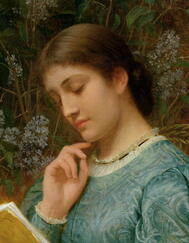| I'm discussing Mansfield Park and its theme of education. Here is a digression on female virtue as it relates to this theme. The fall of Maria Bertram is a central event in the book, and it comes about because of her pride, her passion, and--as Austen tells us--because her moral education had been neglected. "But how little of permanent happiness could belong to a couple who were only brought together because their passions were stronger than their virtue, she could easily conjecture.” -- Elizabeth Bennet, thinking about Lydia and Wickham, in Pride and Prejudice |

I've been reading some recent online discussions about a modern-day Henry Crawford called West Elm Caleb, so this seems like a good time to talk about Austen and sexuality.
Jane Austen’s depictions of human nature are timeless, even if the customs and beliefs of the long 18th century are not.
Since Austen's time, economic and social changes have overthrown the centuries-long enforcement of female chastity before marriage. (And yes, Austen knew there was a double standard in play here, and she mentions this in Mansfield Park.)
Not every modern consumer of Jane Austen novels or adaptations understands just how radically our social mores have changed since her time. For the 1995 BBC Pride and Prejudice mini-series, screenwriter Andrew Davies added additional dialogue not found in the novel, to underscore the crisis brought on when Lydia ran off with Wickham. “Oh, Jane,” Elizabeth exclaims to her sister. “Jane, do you not see that more things have been ruined by this business than Lydia’s reputation?” Later, Jane comes to Elizabeth and confirms, “You meant, I suppose, that you and I… and Mary and Kitty… have been tainted by association; that our chances of making a good marriage have been materially damaged by Lydia’s disgrace.” The sisters are not spelling this out for each other's benefit, but for the viewer's...






 RSS Feed
RSS Feed